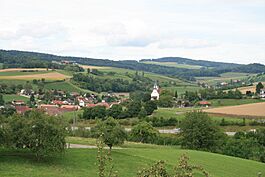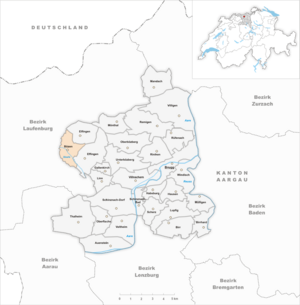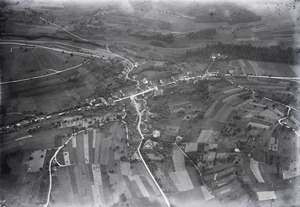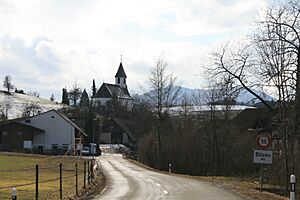Bözen facts for kids
Quick facts for kids
Bözen
|
||
|---|---|---|

Bözen village
|
||
|
||
| Country | Switzerland | |
| Canton | Aargau | |
| District | Brugg | |
| Area | ||
| • Total | 3.95 km2 (1.53 sq mi) | |
| Elevation | 407 m (1,335 ft) | |
| Population
(December 2020)
|
||
| • Total | 804 | |
| • Density | 203.5/km2 (527.2/sq mi) | |
| Postal code |
5076
|
|
| Surrounded by | Effingen, Elfingen, Hornussen, Zeihen | |
Bözen is a charming village located in the Swiss canton of Aargau. It sits west of the Bözberg mountain, in the upper part of the Fricktal valley. Until the end of 2021, Bözen was its own independent town. Now, it's one of four villages that make up the new municipality of Böztal.
Contents
A Look Back: The History of Bözen
The area around Bözen has been home to people for a very long time! We know this from ancient tools like a stone ax from the neolithic (New Stone Age), remains of a Roman farm, and old graves from the Alamanni people.
Bözen was first mentioned in official papers in 1284. Back then, it was called Boze. During the Middle Ages, the village belonged to a nearby place called Elfingen. In 1291, Bözen and much of the Aargau region were sold to the powerful House of Habsburg. Later, in 1322, Bözen came under the control of Königsfelden abbey, a monastery in Windisch.
In 1514, the city of Bern bought the village. From the 16th century onwards, Bözen, along with Elfingen and Effingen, formed a special legal area.
The chapel (a small church) in Bözen was first mentioned in 1381. It was originally part of the church area of Elfingen. Around 1600, Bözen got its own church area.
For a long time, farming was the main way people made a living in Bözen. There were many vineyards, covering about 50 hectares (that's like 123 football fields!) in the mid-1800s. The village started to grow more after the Bözbergtunnel was built in 1875. Between 1840 and 1925, many people worked from home making straw products for the straw plaiting industry. Starting in the 1980s, more houses were built. Also, more people began to travel to work in other towns, especially after regular bus service to Brugg started in 1990.
Where is Bözen? The Geography
Bözen covers an area of about 3.95 square kilometers (about 1.5 square miles). A big part of this land, about 66%, is used for farming. Forests cover about 22% of the area. The remaining land, about 11%, has buildings and roads.
Bözen is known as a "linear village" because its buildings are mostly spread out along a road. The village is located on the slopes of the Bözberg mountain.
What Does the Coat of Arms Mean?
The blazon (official description) of Bözen's coat of arms is Or a Bar Sable. This means it's a gold shield with a black horizontal stripe across the middle.
Who Lives in Bözen? Population Facts
Bözen has a population of about 700 people. A small part of the population, about 15%, are people from other countries. Most people in Bözen speak German, which is about 93% of the population. Albanian and Serbo-Croatian are the next most common languages.
The population of Bözen includes people of all ages. About 8% are young children (0-9 years old), and about 15% are teenagers (10-19 years old). Many adults live in Bözen too, with a good mix of people in their 20s, 30s, 40s, and 50s. There are also older people living in the village.
Most homes in Bözen are owned by the people who live in them. The average household has about 2.76 people.
The people of Switzerland are generally well-educated. In Bözen, about 78% of adults (aged 25–64) have finished high school or gone on to higher education like university. In the 2008/2009 school year, there were 53 students in primary school and 54 students in secondary school in Bözen.
Here's how the population of Bözen has changed over time:
| Historical population | ||
|---|---|---|
| Year | Pop. | ±% |
| 1764 | 361 | — |
| 1850 | 539 | +49.3% |
| 1900 | 376 | −30.2% |
| 1941 | 347 | −7.7% |
| 1950 | 383 | +10.4% |
| 1980 | 372 | −2.9% |
| 2000 | 657 | +76.6% |
How People Work in Bözen: The Economy
In 2007, the unemployment rate in Bözen was about 2.17%, which means most people had jobs. In 2005, many people worked in farming (the primary sector). There were also jobs in manufacturing and construction (the secondary sector). The largest number of jobs were in services, like shops, offices, and healthcare (the tertiary sector).
Many people who live in Bözen also work there. However, some residents travel outside Bözen for their jobs. Also, some people come into Bözen to work. About 13% of working people use public transportation, while over half, about 51%, use a private car to get to work.
Faith and Religion in Bözen
According to a census in 2000, about 21% of the people in Bözen were Roman Catholic. A larger group, about 58%, belonged to the Swiss Reformed Church (a Protestant church). A very small number of people belonged to the Christian Catholic Church of Switzerland.
See also
 In Spanish: Bözen para niños
In Spanish: Bözen para niños
 | Aaron Henry |
 | T. R. M. Howard |
 | Jesse Jackson |







